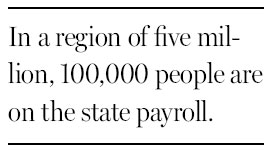Debt-laden Sicily risks becoming 'Greece of Italy'
Updated: 2012-08-05 08:02
By Rachel Donadio(The New York Times)
|
|||||||||
PALERMO, Sicily - As Prime Minister Mario Monti fights to protect Italy from the contagion driving up its borrowing costs to perilous levels, one region in particular has been in the spotlight: Sicily, which some fear has become "the Greece of Italy" and is at risk of defaulting on its high public debts.
|
Raffaele Lombardo, Sicily's former regional president, rejects criticism. "Sicily is at risk of default because Italy is at risk of default," he said. Gianni Cipriano for The New York Times |
Mr. Monti wrote to Sicily's regional president in mid-July warning that he had "serious concerns." A day before, an official in the Sicily branch of Italy's leading industrialists' association called for the island to be put into receivership by the central government to clean up its finances.
When headlines about a potential Sicilian default ricocheted around the globe, the government quickly played down concerns and said it would send 400 million euros, about $486 million, to ease Sicily's liquidity crunch so it could continue to pay salaries and pensions. One government official said that Mr. Monti's letter had been intended for a domestic audience and that Sicily's problems could not spread to other Italian regions.
But with Europe's debt crisis, local politics quickly become international problems. The flare-up over Sicily highlights the challenges that Mr. Monti is facing in trying to use pressure from European leaders and international markets to push Italy's politicians to cut costs. Those expenses have ballooned after decades of a patronage system in which the state has been the primary means of employment in Sicily.
It was also a stark reminder of Italy's national fragility as Mr. Monti struggles to prevent the country from requiring a bailout that would come with the onerous terms that have plagued the Greek and Spanish economies. On July 20, the Milan stock market dropped nearly 5 percent, and the difference in interest rates on Italian and German bonds rose to its highest levels in months.
In an interview on July 20, Raffaele Lombardo, at the time Sicily's regional president since 2008, rejected the criticism.
"Sicily is at risk of default because Italy is at risk of default," Mr. Lombardo said. "We cut expenses, but we don't grow. It's a spiral that is going to bring us to the abyss."
When the two met in Rome on July 24, Mr. Monti imposed a strict regime of spending cuts. Mr. Lombardo stepped down at the end of July. The move is expected to give Mr. Monti slightly more muscle in reining in spending.
But many critics say Italy - and Sicily in particular - has been driven into dire financial straits not by austerity but by the rampant public spending of the past, the product of an entrenched jobs-for-votes system that helped keep Italian governments in power. Today, Sicily's regional government has 1,800 employees and the island employs 26,000 auxiliary forest rangers; in the vast forestlands of British Columbia, there are fewer than 1,500.

Out of a population of five million people in Sicily, the state directly or indirectly employs more than 100,000 of them and pays pensions to many more. Mr. Lombardo said state workers have job protection.
In June, Italy's audit court issued a scathing report saying that Sicily had 7 billion euros, about $8.5 billion, of liabilities at the end of 2011 and showed "signs of unstoppable decline." Sicily's unemployment rate is 19.5 percent, twice the national average, and 38.8 percent of young people do not have jobs.
Many Sicilians, for their part, take a world-weary view of the political class. "If I steal a little, I go to jail; if I steal a lot, I advance my career," Gioacchino De Giorgi, 34, said as he worked in a tobacco shop in Palermo.
He said he was worried about the future. "You've seen what happened to Greece, what happened to Spain," he said. "It will happen here."
Gaia Pianigiani contributed reporting from Rome.
The New York Times
(China Daily 08/05/2012 page10)
